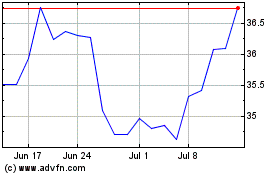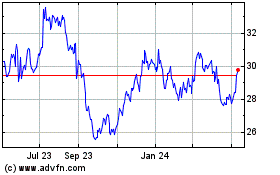By Benoît Faucon
Ahead of an expected lifting of sanctions, several U.S.
corporate giants including personal-computer seller HP Inc. and
General Electric Inc.'s oil-services unit are actively exploring a
market entry.
U.S. companies other than food, aircraft-parts and medicine
suppliers are still banned from conducting direct transactions with
Iran. But last week Maryland Sen. Ben Cardin, the top Democrat on
the Senate Foreign Relations Committee, said at a hearing that
sanctions relief on Tehran could start in January, when an
agreement with world powers over Iran's controversial nuclear
program is implemented.
On the nuclear agreement's "implementation day," the U.S.
Treasury's Office of Foreign Assets Control will issue a general
license authorizing foreign-based arms of U.S. corporations to
engage in activities involving Iran, a U.S. official said.
Worried they could be left behind their European and Asian peers
in the race to do business with a country of over 77 million
people, some American companies have prepared to go as soon as the
sanctions lift, drafting contracts and sending envoys to Iran as
the country gets set to break decades of isolation.
"Major U.S. companies do not seem worried anymore with covering
their tracks in Iran, suggesting a high degree of confidence in the
end of the embargo," said Denis Florin, head of Paris-based energy
consultancy Lavoisier Conseil, who advises foreign companies
seeking to enter the Islamic Republic. But with sanctions slated to
end soon, looking at Iranian opportunities is no longer as
politically charged as it used to be, he said.
The opportunity could be massive. Iran's market for computers,
gaming devices and handsets is set to rise to $13 billion within
four years, from $9.5 billion in 2014, according to U.K.-based
consultancy BMI Research.
Foreign companies still have to tread carefully.
An official at the U.S. Treasury said only "non-U. S. companies
and individuals will not be subject to U.S. sanctions if they
engage in initial discussions about potential business
opportunities or travel to Iran to examine the possibilities of
business relationships after sanctions are lifted."
"Entering into contracts involving Iran before Implementation
Day may be sanctionable," the Treasury says on its website, except
for specifically allowed trades such as food, medicine and aircraft
spare parts.
U.S. companies have been consulting with the State Department
and Treasury to ensure conversations held by their non-American
subsidiaries remain compliant, according to a U.S. State Department
official and other people familiar with the matter. "People are
exchanging draft contracts but nothing has been signed," the U.S.
official said.
As a result, U.S. companies are sending non-American
subsidiaries to test the waters.
In one recent example, Hewlett-Packard (Suisse) Sarl, the Swiss
subsidiary of Palo Alto, Calif.-based HP, last month circulated
draft agreements with Iranian distributors to resell its consumer
products, such as tablets and laptops, in Tehran, according to
people familiar with the prospective contracts.
Non-U.S. HP staffers met the potential distributors in Dubai and
Tehran, and last month held an internal meeting to discuss the
opportunity, the people said.
To keep confidentiality tight, HP exchanged only hard copies of
the documents with its prospective partners and asked them to sign
the documents and return them by post, according to one person
familiar with the matter.
The U.S. computer giant also has told its prospective partners
in Tehran that no deals would be signed by HP or announced until
the nuclear agreement with Iran is completed, the people familiar
with the draft contracts said.
An HP spokeswoman said "business activities, including those
undertaken in the Middle East, are conducted in full compliance
with U.S. and other applicable global trade requirements," but
declined to comment further.
HP has been particularly unsettled by early forays by some of
its competitors into Iran's technology sector, according to people
familiar with its internal discussions.
Earlier this year, Lenovo Group Ltd., the world's largest PC
maker by volume, said it was exploring Iranian opportunities and
invited dozens of Iranian retailers to an event at a plush Tehran
hotel to drum up interest for its latest laptops. The Hong
Kong-based company, which bought International Business Machines
Corp.'s PC business in 2004, retains strong American connections;
it has a second headquarters in Raleigh, N.C. But its Chinese
ownership made the Iranian entry easier, people familiar with the
matter say.
Last year, Apple Inc. started contacts with Iranian distributors
about possibly entering the country with the full gamut of its
business activities, including selling its iPhones, desktop
computers, laptops and even opening Apple stores, should Western
sanctions ease sufficiently.
Talks have continued with local distributors, though they have
been slowed by issues such as Iran's lax intellectual-property
protection, according to people familiar with the matter.
Apple declined to comment on Tuesday.
Other U.S.-registered companies are testing the waters. A
spokesman for international oil-services giant Schlumberger Ltd.,
based and registered in Houston, Paris, London and The Hague, said
its representatives attended a conference in Tehran where oil
contracts were presented last month. He declined to comment
further.
Iran expects to attract $30 billion in investment in oil and gas
fields after offering new, more attractive contracts, its oil
minister, Bijan Zanganeh, has said.
Representatives from Nuovo Pignone, an Italian oil and gas
subsidiary of GE, visited Iran last month as part of an Italian
government delegation to the country, said a spokeswoman for the
U.S. industrial-equipment maker, which is based in Fairfield,
Conn.
"GE and its subsidiaries operate in full compliance with all
applicable sanctions laws," the spokeswoman said. "Like many
companies, we are following the regulatory and commercial
landscapes that may unfold with respect to Iran going forward."
Write to Benoît Faucon at benoit.faucon@wsj.com
(END) Dow Jones Newswires
December 23, 2015 14:10 ET (19:10 GMT)
Copyright (c) 2015 Dow Jones & Company, Inc.
HP (NYSE:HPQ)
Historical Stock Chart
From Mar 2024 to Apr 2024

HP (NYSE:HPQ)
Historical Stock Chart
From Apr 2023 to Apr 2024
